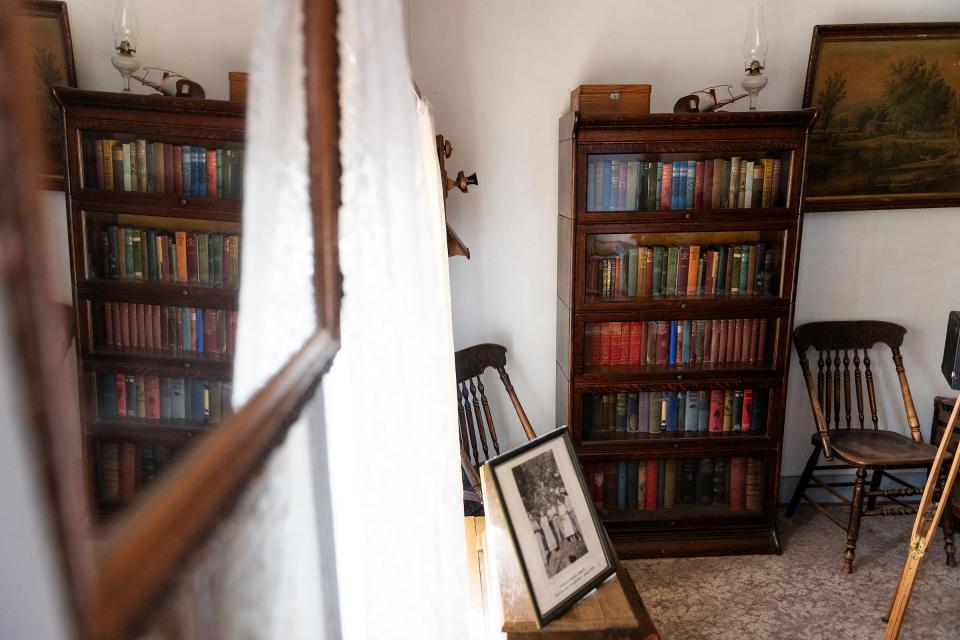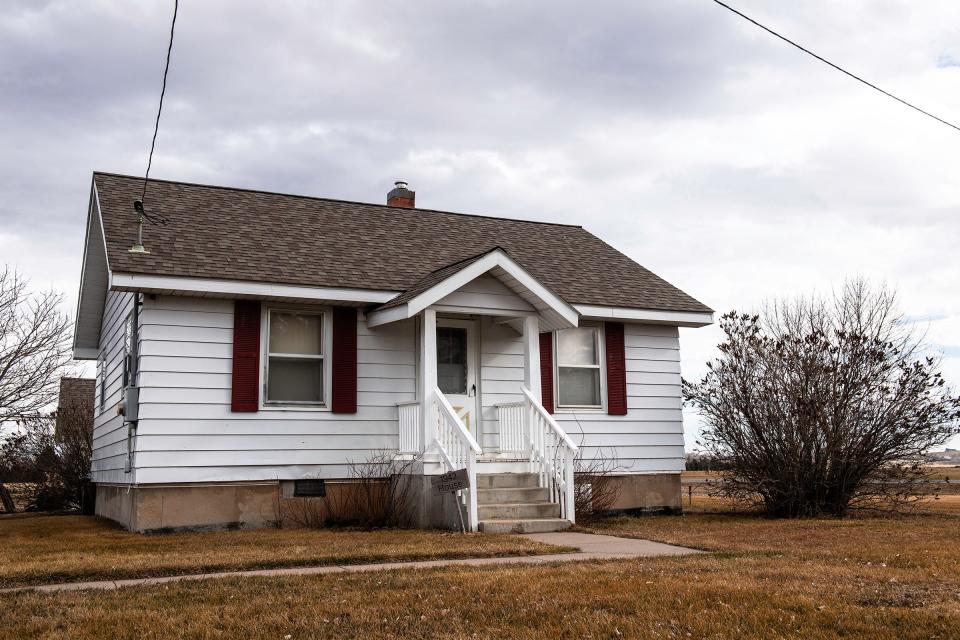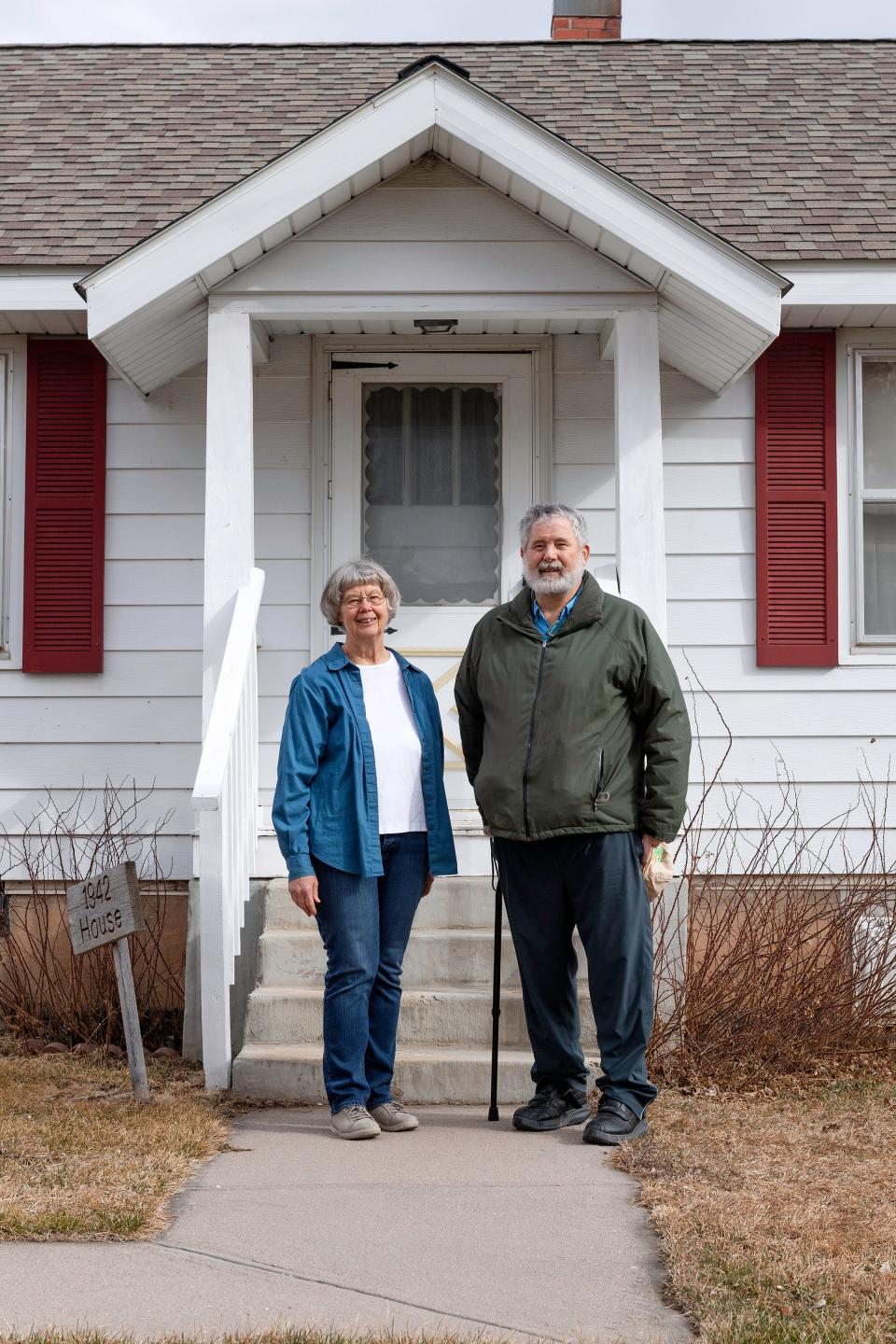After 130 years of history, the future of Larimer County's Bee Family Farm is up in the air
After opening the garage door of his family's mid-century brick shed one afternoon early this month, Bob Bee pointed to the 85-year-old John Deere Model B in the corner.
The tractor started it all. Well, at least it's the origin story of Bob, 71, and his older sister Liz (Bee) Harrison, 75.
After purchasing the John Deere new in 1939, Bob and Liz's father, Francis Bee, worked it so hard on his family's Northern Colorado farm that he made himself sick.
"The doctor told him he needed to take a break," Bob recalled. "So, he went down to Colorado Springs where his brother worked as a county agent. He walked into his office ..."
"... And our mother was his secretary," Liz chimed in.
Francis asked his brother, John, if he could deliver his mail to the office the following day. It was all a ruse to see John's secretary, Sylvia, again and ask her on a date.
It worked out in the end, and the two wed in 1942. They settled on Francis' family farm near Fort Collins and had seven children, including Liz and Bob. The rest is history and — like most things history-related in the Bee family — signs of the family's life are sprinkled around their sprawling 19th-century farm.
After being in the Bee family for 130 years and serving as a preserved look into the past as the Bee Family Centennial Farm Museum for the past 15, however, the family is looking toward a future where they may no longer be its stewards.
Late last year, after another season managing the nonprofit museum, leading its summer and fall farm tours and caring for its menagerie of animals, Bob, Liz and Liz's husband, Rich Harrison — who all live on the property — announced that the Bee Family Centennial Farm Museum would not reopen in 2024.

“My husband and I are both in our mid-70s ... we’re all in our 70s. And it’s getting to be a lot more work every year,” Liz said.
The museum's costs have gone up in recent years, including everything from chicken feed to mailing permits to its utility bills, Liz said.
A new federal regulation governing the handling, care, treatment and transportation of birds covered by the Animal Welfare Act also went into effect this month, which Bob says would have required the farm — which included its turkeys and chickens on tours — to be inspected and keep a veterinarian on retainer.
"People are sad," Liz said of the public's reaction to news of the museum's closure.
But this is not necessarily the end of the road for the historic Bee Farm. After 130 years, how could it be?
'They don’t just have all the stuff. They have all the stories.'
Before Adam Thomas was an associate teaching professor in Colorado State University's history department, he was a graduate student there working toward his master's degree in history.
It was there that one of his professors gave him an assignment that was a little different. There was this family — the Bees — who needed help documenting the history of their farm in order to get it on the National Register of Historic Places, according to Thomas.
This was back in March 2001 — "calving season," Thomas recalled, "... not a particularly pleasant time of year."
Thomas, who is originally from Pennsylvania, said he went to the Bee farm expecting the big red barns and buck and rail fences of his home state. Instead, he was greeted by the Bees' vast network of various farm buildings.
There was the homestead's original 1894 house, the turn-of-the-century horse barn, loafing and wagon sheds, a 1920s-era chicken house and a migrant worker shack that likely dates back to the 1930s. The tidy World War II-era house Liz and Bob grew up in was impossible to miss, as was the mid-century farmhouse Francis and Sylvia moved their family to in 1957.

There were garages and sheds filled with vintage cars — often purchased new by Bee family members or their in-laws — ranging from a 1924 Ford Model T to the 1939 John Deere B and a forest green 1945 Chevy truck that Francis purchased right after WWII. For generations, the still-running truck hauled grain and sugar beets, shuttled 4-H calves off to the county fair and even carried the very bricks that were used to construct the shed it now sits in, according to Liz.
"I started to realize how many structures were on the property and how they each represented a different part of history," Thomas said. "Then (Liz) started showing me the vastness of their collection — from tractors, trucks and automobiles, down to thimbles, needs and thread.”
“They don’t just have all the stuff. They have all the stories to go along with it," Thomas added. "I was hooked after that."
Thomas got to work helping Liz pull together the farm's extensive history, which started when Bob and Liz's great-great uncle and great-great aunt, Al and Lizzie Morse, bought its original 160 acres and built its tiny, still-standing two-room farmhouse back in 1894.
After Al's death in 1899, John Bee — who was married to Lizzie's sister, Fanny — took over the farm with his son, Arleigh Bee (Liz and Bob's grandfather). Fanny and John sold their own homestead to the North Poudre Irrigation Company in 1902 and moved their two-story farmhouse to the property that year.
Over the years, farming duties were passed down through the family from John to Arleigh, to Arleigh and his son Francis and, ultimately, to Bob and his brother, Philip.
After a century in the same family, the Bee Family Farm was officially designated as a centennial farm as part of the Colorado Department of Agriculture's Centennial Farms & Ranches Program. It is one of 14 Larimer County Centennial Farms and Ranches, according to History Colorado.
Following its centennial designation, Liz said she and her father started going through things on the farm.
“Our dad saved everything. When his parents passed away, everything was just saved and stored. I mean, there was a place to put things and they never moved, so they kept things," Liz explained.
When Francis died in 1996, "the question became, 'what do we do with everything?'" Liz continued. "I hated to see it get split up and go different directions. It was time to do something with it.”
With Thomas' help, the family pulled together the farm's history and successfully nominated it for the National Register of Historic Places. It was designated in 2002.
Around that same time, Bob and Philip stopped farming and 140 of the farm's original 160 acres were placed in a conservation easement and sold to CSU's Agricultural Research, Development and Education Center.
Six years later, after taking on the arduous task of gathering and organizing more than a century of accumulated farm artifacts into its network of buildings, the farm museum opened. From May through October each year, the museum hosted public tours and school field trips showing its visitors a rare frozen-in-time glimpse of Northern Colorado farm life.
“It’s been rewarding to do this," Liz said. "I think we’ve learned a lot — a lot of history.”

While the farm museum has closed and Bob and Liz have already sold off some of its animals, they plan to keep the farm buildings and artifacts untouched for now. They will also keep its nonprofit status active in hopes that someone might step in to pick up the baton.
That could mean a volunteer group takes over the museum's operations or a fundraising effort raises enough money to cover the costs of a museum director, Liz suggested.
"We're just exploring our options," she added.
“It would be really nice if somebody could come in and take over and keep the history part of it going to teach people, but if nobody has that interest or that ability, it will probably be gone," Bob added.
Since its inception, the farm and museum has run off a shoestring budget and been carried largely on the backs of Liz, Rich and Bob, said Thomas, who has served on the museum's board of directors roughly 10 to 15 of the last 23 years.
"I'm heartbroken (that they're closing)," Thomas said. "I love that place."
"On the other hand, I admire the Bee family so much — particularly Liz — because they sacrificed a lot. That land could have easily been developed, but they sacrificed a lot to tell the history of their family and the history of farming in Colorado. They do deserve a break."
In the end, however, Thomas likens this latest chapter for the Bee Farm to "a moment of institutional transition." After more than 20 years helping shepherd its history, the professor is currently working with CSU's Public and Environmental History Center to organize a meeting of potential stakeholders in hopes that they can identify some possible solutions for the farm's predicament.
"While it's closing to the public for the summer, we don't see this as an end," Thomas said.
This article originally appeared on Fort Collins Coloradoan: Fort Collins history: After 130 years, Bee Farm's future unknown

